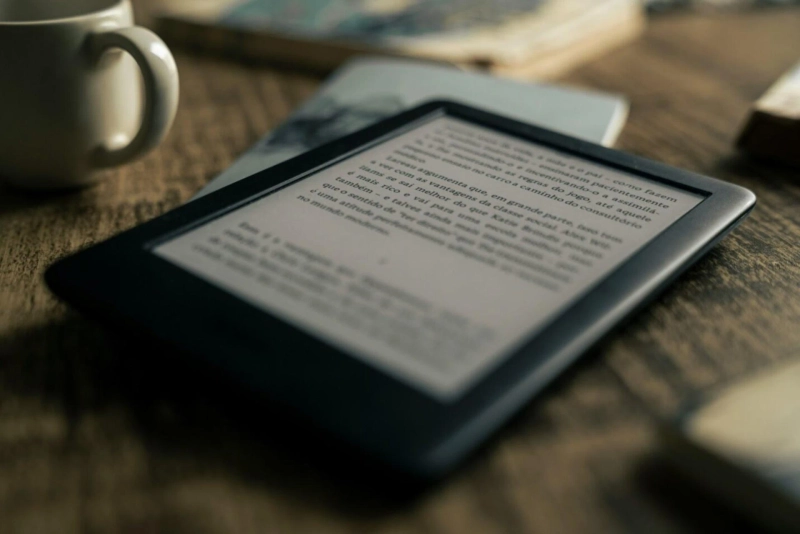We fondly remember the weight of a story in our hands, the crisp sound of turning pages, and the comforting scent of printed tales. Yet, as the hands of time relentlessly tick, we find ourselves navigating an unforeseen path that transcends the tangible and pushes us into the intangible realm of ebooks. It is a journey that stirs sentiments and unfolds the pages of a narrative where print meets pixel, where the simplicity of a childhood library gives way to the vast expanse of a digital bookshelf.
Join us as we navigate this, exploring the evolution of traditional hardcovers to ebooks. In this digital age, the journey of literature has become an exploration of new possibilities and an adaptation to the dynamic forces of change.
The Historical Prelude
To appreciate the significance of the evolution from print to pixel, it is essential to understand the historical context. For centuries, books were synonymous with ink on paper, bound into hardcovers that adorned the shelves of libraries and bookstores. The tactile pleasure of flipping through physical pages and the unmistakable scent of paper and ink –were integral aspects of the reading experience.
However, with the advent of digital technology, the narrative began to change. The rise of computers, e-readers, and smartphones brought about a paradigm shift, challenging the dominance of the printed page. Ebooks emerged as a viable alternative, offering readers the convenience of carrying an entire library in their pockets.
The Technological Metamorphosis
The transition from print to pixel was not just a change in the medium; it marked a technological metamorphosis. Ebooks leveraged electronic ink displays, making it possible to replicate the readability of traditional print on digital screens. The introduction of e-readers, such as the Kindle, Nook, and others, further fueled the revolution by providing purpose-built devices optimized for the digital reading experience.
This transformation wasn't just about convenience. Ebooks allowed for customizable fonts, adjustable text sizes, and the ability to carry an entire library in a device smaller than a single hardcover book. Readers could highlight passages, search for definitions, and even share thoughts with others in real-time. The interactive and dynamic nature of ebooks fundamentally altered the static nature of traditional books.
The Publishing Industry in Flux
As literature embraced the digital world, the publishing industry faced both challenges and opportunities. Traditional publishers had to adapt their business models to accommodate ebooks, grappling with pricing, distribution, and piracy questions. Self-publishing became a viable avenue for many authors, democratizing the process and giving voice to diverse storytellers.
Publishers, too, had to rethink their approach to marketing and distribution. The global accessibility of ebooks meant that readers from different corners of the world could access the same book simultaneously. The digital format facilitated easy updates and corrections, eliminating the need for new print runs. Once dominated by printing presses and physical distribution networks, the publishing landscape now hinges on digital platforms and online retailers.
Changing Landscape of Book Consumption
The evolution from print to pixel also brought about a shift in how readers consume books. Ebooks provide unparalleled accessibility, allowing readers to purchase and download books instantly. This immediacy transformed reading into an on-demand experience, catering to the fast-paced lifestyle of the modern era.
Furthermore, ebooks opened paths for enhanced interactivity. Features like hyperlinks, multimedia content, and interactive elements enriched the reading experience, particularly in genres like educational materials and non-fiction. The line between traditional books and other forms of media blurred, creating a hybrid reading experience that extended beyond mere words on a page.
Advantages of Embracing Ebooks
Portability and Convenience: Ebooks allow readers to carry an entire library in a single device, enhancing portability and convenience. Whether on a commute or a vacation, readers can access their favorite books with ease.
Customization and Accessibility: Ebooks offer customization options, from adjustable fonts to background colors, catering to individual preferences. Additionally, the accessibility features in ebooks make reading more inclusive for people with visual or reading impairments.
Cost-Effectiveness: Digital publishing reduces production costs associated with printing, distribution, and storage. This often translates into lower prices for ebooks, making literature more affordable and accessible to a broader audience.
Environmental Sustainability: The shift to ebooks aligns with broader environmental concerns. By reducing the demand for paper and ink, digital publishing contributes to sustainability efforts and reduces the carbon footprint associated with traditional publishing practices.
Unleash the suspense with Dan Durkee's riveting ebook
Why wait? Elevate your reading experience with some of the best horror ebooks. Immerse yourself in the heart-wrenching heroism of "Survive," where courageous firefighter Keith Wright battles the elements and the unknown. Survive is one of those dramatic survival ebooks that will have you on the edge of your seat. Grab your digital copy now!
About the Author
Jackson P. is a seasoned storyteller passionate about unraveling the threads of literature's evolution. With a curious mind and a love for storytelling, Jackson crafts a narrative that explores the transformative journey from traditional hardcovers to ebooks.



